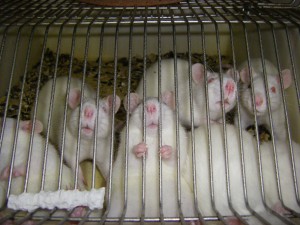European Ombudsman Ruling on PETA Complaint a Victory for Animals Used in EU Chemical Tests
 © Doctors Against Animal Experiments
© Doctors Against Animal ExperimentsIn 2011, PETA learned that tens of thousands of animals were being poisoned and killed in avoidable tests, contrary to the Registration, Evaluation, Authorisation and Restriction of Chemicals Regulation (REACH), which states that animals must only be used as a last resort. PETA immediately and repeatedly contacted ECHA about this unconscionable use of animals, yet ECHA continued to shirk its duty to ensure that animal use is minimised.
We took our concerns to the European Ombudsman, who is the government official responsible for investigating complaints about European Union institutions. Her decision today, which upholds a key argument in our complaint, has enormous implications for preventing the suffering of millions of animals and confirms that ECHA has failed to fully accept its mandate and use all tools at its disposal to minimise animal experiments .
It is estimated that upwards of 13 million animals will suffer and die in experiments authorised under REACH. But the legislation is clear: alternative testing methods to animals must be used whenever possible, and testing on animals must be undertaken only as a last resort.
This is not happening. ECHA’s 2011 and 2014 reports on “The Use of Alternatives to Testing on Animals for the REACH Regulation” demonstrated that thousands of animals were used in painful skin and eye tests that could have been avoided. Just as worrisome, hundreds of studies were conducted without prior submission and approval of a testing proposal. The Ombudsman further found that ECHA’s refusal to ensure that industry comply with the principle of using animals only as a last resort is akin to amending REACH informally without the involvement of the European Commission.
In light of ECHA’s repeated failings, an estimated 100,000 animals have suffered and died in experiments on animals that could have been avoided. While it’s too late to bring these animals back, ECHA can reduce this disastrous death toll by accepting its responsibilities and immediately incorporating the Ombudsman’s advice. Of course, scientists working for PETA and our international affiliates will continue to scrutinise ECHA’s work and do everything they can to make sure that happens.



